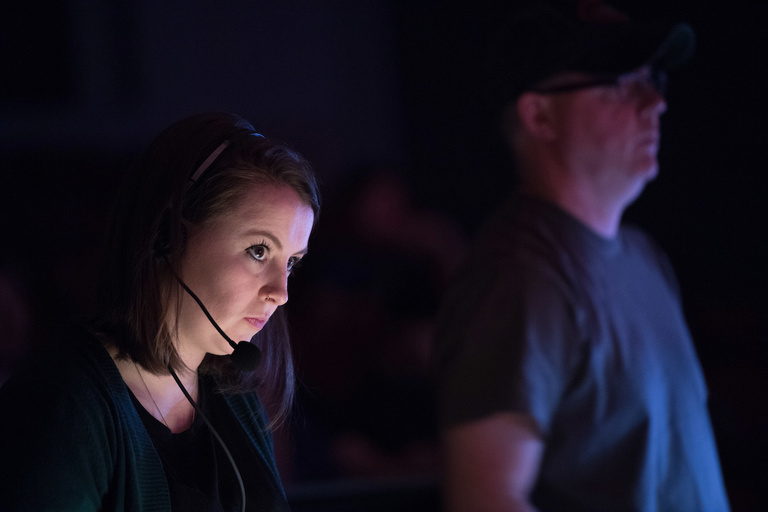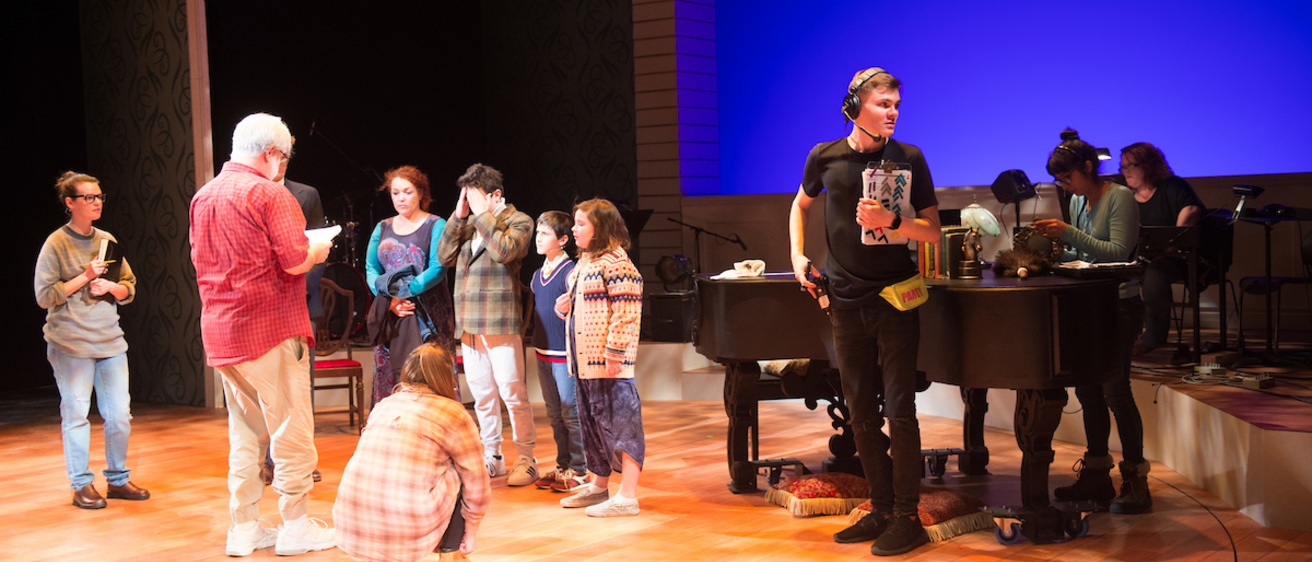The house lights go down, the curtain goes up, the stage lights come on, and an actor appears.
It takes many people working behind the scenes to make this possible, but none of it would happen if it weren’t for a stage manager saying “Go.”
Fun Home
When:
8 p.m. on Dec. 1 and 2;
2 p.m. on Dec. 3;
8 p.m. on Dec. 6–9
Where:
E.C. Mabie Theatre
Tickets:
Buy tickets through the Hancher Box Office.
“We’re sort of like air-traffic control,” says Nic Steffes, a senior from Carroll, Iowa, majoring in theater arts at the University of Iowa. “Everything that happens on stage is called by the stage manager.”
The stage manager is the linchpin that holds all aspects of a production together. They schedule and attend most every rehearsal and meeting, taking notes and relaying decisions and directions to the appropriate people. Stage managers are responsible for launching each of the hundreds of cues a show may have for lighting, sound, prop and set changes, special effects, and more. And every one of these actions needs to happen at a precise moment, not only to make the show run smoothly but also safely—no one wants an actor or crew member to be injured by the mistimed movement of a set piece.
Among the myriad talents necessary for the job, attention to detail and excellent communication and leadership skills are particularly important. But alumni and current students say they are up to the task, thanks to the UI’s Master of Fine Arts in Stage Management program.
“It is more challenging than I could have imagined,” says Aubrey Near, a second-year MFA student in stage management from Independence, Kansas, who is managing the upcoming UI musical Fun Home. “The program tests your limits. The mental and emotional and physical stretch that you experience as a student here is so invigorating. It gives us a competitive edge when we graduate because we can handle a lot.”
Karl Alphonso, a 2008 UI MFA graduate from Mumbai, India, who is entering his 11th season with the Oregon Shakespeare Festival, points specifically to the opportunity to work on new plays while at the UI. He particularly remembers productions of The Puzzle Locker and his thesis production of Versailles.

“I discovered new-play development at Iowa,” Alphonso says. “It shaped what I wanted to do professionally. I think it’s fair to say I was just fighting to stay afloat certain days during that production, but those experiences really have served me well going forward because what I have done at OSF, apart from classical and musical work, is a lot of new plays.”
Melissa Turner, lecturer and production stage manager for the UI Department of Theatre Arts and the Iowa Summer Repertory Theatre (Iowa Summer Rep), says the stage manager role as we know it doesn’t exist much outside of the United States.
“It’s unique in how it’s developed and formed in the U.S., that you put so much trust in one person who’s responsible for so many aspects,” Turner says. “But we don’t want any of those aspects to go away. We love them all.”
First-year MFA student Mariana Tejeda, who is from Mexico City, spent years working in theater companies in Mexico, where she says the stage manager role is often fulfilled by the director’s assistant.
“We do a lot of things, but it can be sort of chaotic,” says Tejeda, who is an assistant stage manager for Fun Home. “And I always thought there must be a better way to do it.”
She says if she returns to Mexico after graduation, she knows she won’t be able to change the whole system, but everything she has learned about stage management will be put to use in her future work, no matter her title.
The UI’s MFA program in stage management is unique in several ways. First, it’s small, accepting only two new students each year. And the students are not taught a single way to manage a production; instead, goals are tailored to the needs of individual students.
“We’re not interested in cookie cutter,” Turner says. “We’ll work with the student to find where their strengths are and where their weaknesses are, and we’ll help them build strength in those weaknesses and create flexibility where they are already strong to make them even stronger.”
UI students are involved in more than 25 theatrical productions each year, many of them new plays, but also dance performances and operas.
“I am very fond of opera, but I also love musicals, dance, and new works,” says Amber Lewandowski, a 2014 UI MFA graduate from Amherst, Ohio, and head of the undergraduate stage management program and production manager at the University of Utah. “Iowa gave me the opportunity to work in all of those genres, and I truly believe I am a better stage manager because of my diversified portfolio. They all require a slightly different skill set, and yet feed into each other as well. At Iowa, it’s expected that you will try something outside the theater department at least once.”
Turner says this variety makes students more employable. She points to her own experience of being able to pick up work as a stage manager for operas between shows she was working on.
“If I hadn’t had those skills to work in opera, I would have had to do office work or something during those downtimes,” Turner says. “If you’re flexible enough, you can pick up gigs all over the place. It means you have more opportunities to work.”
Alphonso says the best advice he can offer current students is to build their networks.
“The theater is a small world, and the relationships you build with directors, designers, and other stage managers will often continue beyond a specific production, so keep nurturing them,” he says.
Along with regularly inviting alumni working in stage management to talk with current students, the UI’s program facilitates an annual trip to theater hubs such as New York City; Washington, D.C.; and Chicago. During these trips, students have the opportunity to broaden their professional networks by shadowing stage managers for several productions and meeting others.
And, as part of the Partnership of the Arts, the UI brings playwrights and directors to campus to develop new work in collaboration with faculty and students.
“The networking we were able to do with the partnership show was invaluable,” Lewandowski says. “My classmate stage managed a new musical with playwrights from New York City and a New York City director and then went to New York to stage manage the workshop of that same show professionally—really launching her career in the process.”
Graduate students aren’t the only ones who benefit from the MFA program or the focus on new works. Steffes, who knew when he entered college that he wanted to be a stage manager, petitioned to take some MFA courses and has worked as an assistant stage manager for several shows, including Fun Home. His internships over the past several years have included the Children’s Theatre Company in Minneapolis, Wicked on Broadway, and, this past summer, at Williamstown Theatre Festival in Massachusetts.
“Williamstown was a competitive internship and they really expected us to know what we were doing,” Steffes says. “I took a step back and realized I’m glad I went to Iowa. I’ve gotten good training and been able to work on new works. So many other interns had only done produced works. New works are harder because things change quickly. The playwright is in the room rewriting, so props are changing, they add a character, they cut a character. The stage managers this summer kept saying, ‘New work is hard,’ but I felt prepared because I had already done a lot of new work.”
The UI’s December 2017 main-stage production of the 2015 Tony Award winner for Best Musical, Fun Home, is one of the biggest shows some of the student stage managers have tackled so far. While the cast may not be huge—nine actors—there are other challenges, including working with child actors and coordinating 300 light cues, 42 costume changes, 13 turntable moves, and eight cues for the fly system, which allows the crew to quickly and quietly hoist things, such as scenery, into and out of the audience’s view.
Stage management may not always be glamorous. It involves working a lot of hours and performing repetitive tasks, and there’s no taking a bow on stage after a show. But students say they wouldn’t want to do anything else night after night.
“It’s never the same thing,” Turner says. “You get excited about not only the work but working with the people. One of the nice things about being a stage manager is creating and engaging with the full community of artists you get to work with. That community feeds our soul.”
